英语词组及短语范文
英语常用词组大全(2000词以上)
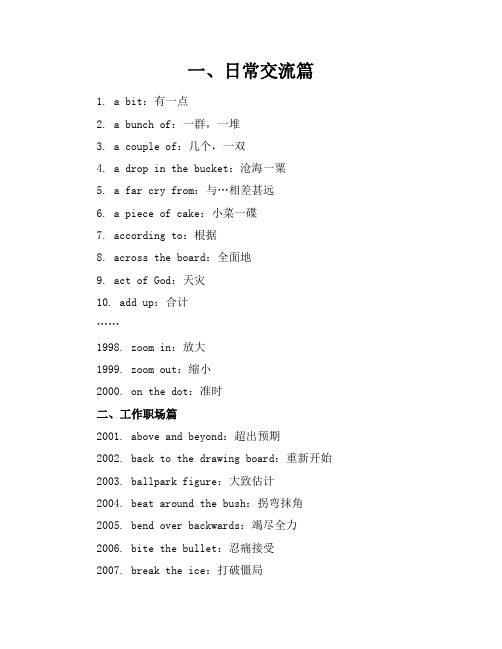
一、日常交流篇1. a bit:有一点2. a bunch of:一群,一堆3. a couple of:几个,一双4. a drop in the bucket:沧海一粟5. a far cry from:与…相差甚远6. a piece of cake:小菜一碟7. according to:根据8. across the board:全面地9. act of God:天灾10. add up:合计……1998. zoom in:放大1999. zoom out:缩小2000. on the dot:准时二、工作职场篇2001. above and beyond:超出预期2002. back to the drawing board:重新开始2003. ballpark figure:大致估计2004. beat around the bush:拐弯抹角2005. bend over backwards:竭尽全力2006. bite the bullet:忍痛接受2007. break the ice:打破僵局2008. the book:按规矩办事2009. call it a day:收工,结束……2998. work your fingers to the bone:辛勤工作2999. wrong end of the stick:误会3000. year in, year out:年复一年在职场中,熟练运用这些词组能让你在与同事、上级和客户的沟通中更加游刃有余。
这些词组不仅有助于表达你的专业态度,还能让你在处理各种工作场景时更加自信。
三、情感表达篇3001. a weight off my shoulders:如释重负3002. at the end of my rope:山穷水尽3003. break my heart:让我心碎3004. can't stand the sight of:无法忍受看到3006. dance to a different tune:改变态度3007. feel a lump in my throat:喉咙哽咽3008. give me the creeps:让我毛骨悚然3009. have a good laugh:开怀大笑3010. it's a small world:世界真小……3998. wear my heart on my sleeve:坦率表达情感3999. with flying colors:出色地4000. you can say that again:说得太对了情感表达是人际交往中的重要部分,掌握这些词组能帮助你更准确地传达内心的感受,增进与他人的情感联系。
人教版八年级下册英语复习 Unit 4 重要短语、句型、重点讲解及作文范文

人教版八年级下册英语 Unit 4重要短语、句型、重点讲解及作文范文Unit 4 Why don’t you talk to your parents?一、重点短语1. have free time有空闲时间2. allow sb. to do sth. 允许某人做某事3. hang out with sb. 与某人闲逛4. after-school classes课外活动课5. get into a fight with sb. 与某人吵架/打架6. until midnight直到半夜7. talk to sb. 与某人交谈8. too many太多9. study too much学得过多10. get enough sleep有足够的睡眠11. write sb. a letter给某人写信12. call sb. up打电话给某人13. surprise sb. 令某人惊讶14. look through翻看15. be angry with sb. 生某人的气16. a big deal重要的事17. work out成功地发展;解决18. get on with不11睦相处;关系良:19. fight a lot经常吵架/打架20. hang over笼罩21. refuse to do sth. 拒绝做某事22. offer to do sth. 主动提出做某事23. so that以便24. mind sb. doing sth. 介意某人做某事25. all the time一直26. in future今后27. make sb. angry使某人生气28. worry about sth. 担心某事29. copy one’s homework抄袭某人的作业30. be oneself做自己31. family members32. spend time alone独自消磨时光33. give sb. pressure给某人施压34. have a fight with sb. 与某人吵架35. compete with sb. 与某人竞争36. free time activities业余活动37. get better grades取得更好的成绩38. give one’s opinion提出某人的观点39. learn exam skills学习应试技巧40. practice sports体育训练41. cause stress造成压力42. cut out删除第1页共12页二、重点句型1. I studied until mid night last night so I didn’t get enough sleep.我昨晚学习到半夜所以睡眠不足。
七年级上册英语话题作文范文及词组、句型汇总
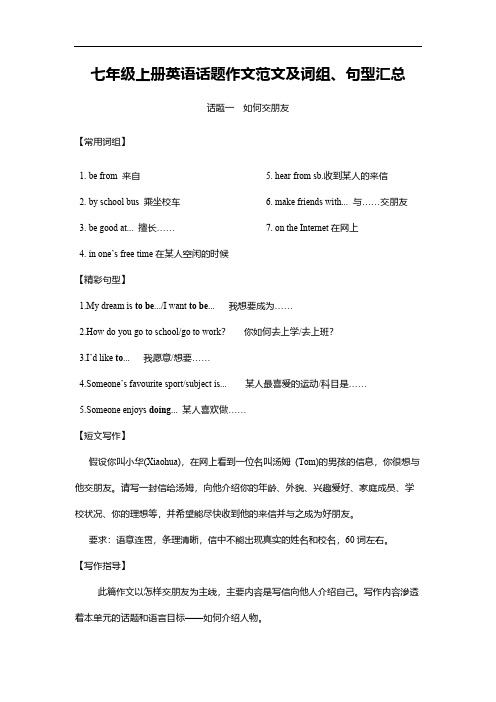
七年级上册英语话题作文范文及词组、句型汇总话题一 如何交朋友【常用词组】1. be from 来自2. by school bus 乘坐校车3. be good at... 擅长……4. in one’s free time在某人空闲的时候5. hear from sb.收到某人的来信6. make friends with... 与……交朋友7. on the Internet在网上【精彩句型】1.My dream is to be.../I want to be... 我想要成为……2.How do you go to school/go to work?你如何去上学/去上班?3.I’d like to... 我愿意/想要……4.Someone’s favourite sport/subject is... 某人最喜爱的运动/科目是……5.Someone enjoys doing... 某人喜欢做……【短文写作】假设你叫小华(Xiaohua),在网上看到一位名叫汤姆(Tom)的男孩的信息,你很想与他交朋友。
请写一封信给汤姆,向他介绍你的年龄、外貌、兴趣爱好、家庭成员、学校状况、你的理想等,并希望能尽快收到他的来信并与之成为好朋友。
要求:语意连贯,条理清晰,信中不能出现真实的姓名和校名,60词左右。
【写作指导】此篇作文以怎样交朋友为主线,主要内容是写信向他人介绍自己。
写作内容渗透着本单元的话题和语言目标——如何介绍人物。
在写作过程中要明确以下几点: 1. 由作文要谈及的主要内容决定我们在写作中要运用“自我介绍”结构,设计人物的外貌、年龄、爱好、家庭成员等等; 2. 结合话题内容,我们在写作过程中要大量用到自我介绍的短语和句型。
【范文赏析】Dear Tom,I’m so happy to get your information on the Internet today. I would like to be your e-friend. Now, I want to tell you something about myself.I’m Xiaohua. I am thirteen years old. I have black hair and black eyes. I like playing basketball. I enjoy playing badminton, too.There are four people in my family: my parents, my elder sister and me. My father is a Chinese teacher. My mother is a doctor. My sister and I are middle school students.I study in Grade Seven at No.2 Middle School. My favourite subject is English. I like my school very much. I would like to be a doctor in the future. I hope to hear from you soon and make friends with you.Yours,Xiaohua话题二介绍日常生活【常用词组】1.daily life 日常生活2. get up 起床3. dress oneself 某人自己穿衣服4. have breakfast/lunch/supper吃早/午/晚餐5. go to school 去上学6. have lessons 上课7. in the morning/afternoon 在早上/下午8. watch TV 看电视9. do homework 做家庭作业10. take a shower 淋浴11. go to bed 去睡觉【精彩句型】1.I get up at six. 我6点起床。
英语词组及短语范文
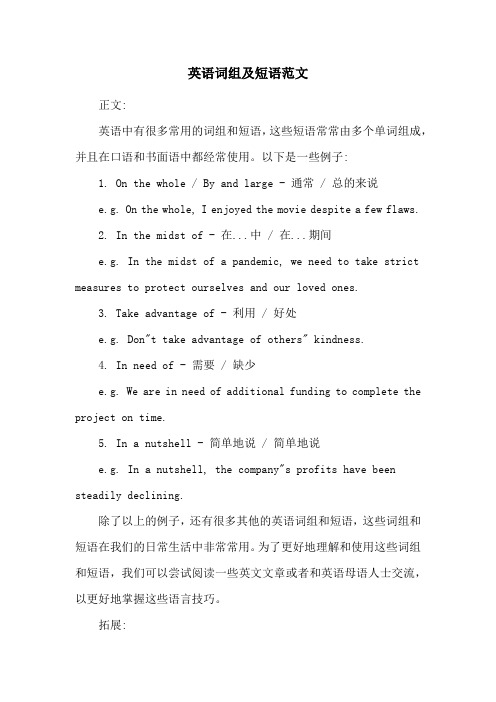
英语词组及短语范文正文:英语中有很多常用的词组和短语,这些短语常常由多个单词组成,并且在口语和书面语中都经常使用。
以下是一些例子:1. On the whole / By and large - 通常 / 总的来说e.g. On the whole, I enjoyed the movie despite a few flaws.2. In the midst of - 在...中 / 在...期间e.g. In the midst of a pandemic, we need to take strict measures to protect ourselves and our loved ones.3. Take advantage of - 利用 / 好处e.g. Don"t take advantage of others" kindness.4. In need of - 需要 / 缺少e.g. We are in need of additional funding to complete the project on time.5. In a nutshell - 简单地说 / 简单地说e.g. In a nutshell, the company"s profits have been steadily declining.除了以上的例子,还有很多其他的英语词组和短语,这些词组和短语在我们的日常生活中非常常用。
为了更好地理解和使用这些词组和短语,我们可以尝试阅读一些英文文章或者和英语母语人士交流,以更好地掌握这些语言技巧。
拓展:1. On the whole / By and large - 这些短语通常用于表达一个整体的情况或者结论。
on the whole 表示总体上,总的来说,by and large 表示总的来说,主要强调“几乎完全地,充分地”。
(完整word版)高中英语词组固定搭配及常用短语完美总结
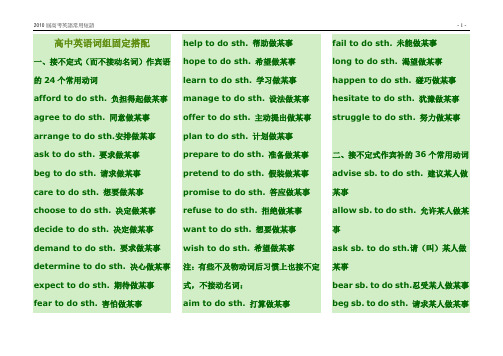
高中英语词组固定搭配一、接不定式(而不接动名词)作宾语的24个常用动词afford to do sth. 负担得起做某事agree to do sth. 同意做某事arrange to do sth.安排做某事ask to do sth. 要求做某事beg to do sth. 请求做某事care to do sth. 想要做某事choose to do sth. 决定做某事decide to do sth. 决定做某事demand to do sth. 要求做某事determine to do sth. 决心做某事expect to do sth. 期待做某事fear to do sth. 害怕做某事help to do sth. 帮助做某事hope to do sth. 希望做某事learn to do sth. 学习做某事manage to do sth. 设法做某事offer to do sth. 主动提出做某事plan to do sth. 计划做某事prepare to do sth. 准备做某事pretend to do sth. 假装做某事promise to do sth. 答应做某事refuse to do sth. 拒绝做某事want to do sth. 想要做某事wish to do sth. 希望做某事注:有些不及物动词后习惯上也接不定式,不接动名词:aim to do sth. 打算做某事fail to do sth. 未能做某事long to do sth. 渴望做某事happen to do sth. 碰巧做某事hesitate to do sth. 犹豫做某事struggle to do sth. 努力做某事二、接不定式作宾补的36个常用动词advise sb. to do sth. 建议某人做某事allow sb. to do sth. 允许某人做某事ask sb. to do sth.请(叫)某人做某事bear sb. to do sth.忍受某人做某事beg sb. to do sth. 请求某人做某事cause sb. to do sth. 导致某人做某事command sb. to do sth. 命令某人做某事drive sb. to do sth .驱使某人做某事elect sb. to do sth. 选举某人做某事encourage sb. to do sth. 鼓励某人做某事expect sb. to do sth. 期望某人做某事forbid sb. to do sth. 禁止某人做某事force sb. to do sth. 强迫某人做某事get sb. to do sth. 使(要)某人做某事hate sb. to do sth. 讨厌某人做某事help sb. to do sth. 帮助某人做某事intend sb. to do sth. 打算要某人做某事invite sb. to do sth. 邀请某人做某事leave sb. to do sth. 留下某人做某事like sb. to do sth. 喜欢某人做某事mean sb. to do sth. 打算要某人做某事need sb. to do sth. 需要某人做某事oblige sb. to do sth. 迫使某人做某事order sb. to do sth. 命令某人做某事permit sb. to do sth. 允许某人做某事persuade sb. to do sth. 说服某人做某事prefer sb. to do sth. 宁愿某人做某事request sb. to do sth. 要求某人做某事remind sb. to do sth. 提醒某人做某事teach sb. to do sth .教某人做某事tell sb. to do sth. 告诉某人做某事train sb. to do sth. 训练某人做某事trouble sb. to do sth. 麻烦某人做某事want sb. to do sth. 想要某人做某事warn sb. to do sth. 警告某人做某事wish sb. to do sth. 希望某人做某事注:不要受汉语意思的影响而误用以下动词句型:汉语说:“害怕某人做某事”,但英语不说fear sb. to do sth.。
词组大全英语
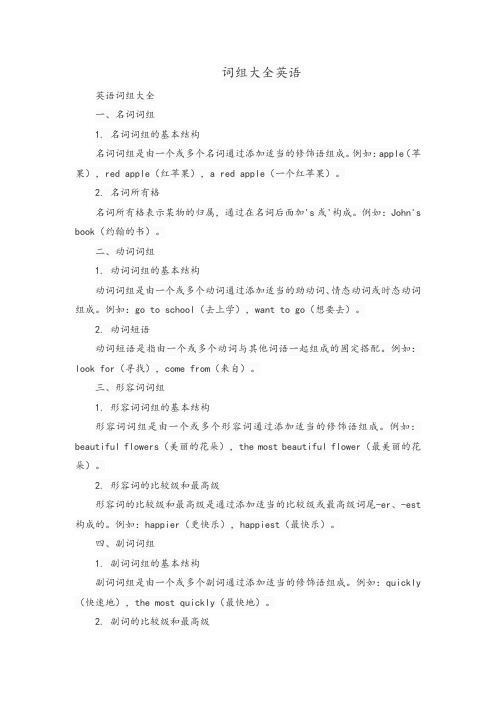
词组大全英语英语词组大全一、名词词组1. 名词词组的基本结构名词词组是由一个或多个名词通过添加适当的修饰语组成。
例如:apple(苹果),red apple(红苹果),a red apple(一个红苹果)。
2. 名词所有格名词所有格表示某物的归属,通过在名词后面加's或'构成。
例如:John's book(约翰的书)。
二、动词词组1. 动词词组的基本结构动词词组是由一个或多个动词通过添加适当的助动词、情态动词或时态动词组成。
例如:go to school(去上学),want to go(想要去)。
2. 动词短语动词短语是指由一个或多个动词与其他词语一起组成的固定搭配。
例如:look for(寻找),come from(来自)。
三、形容词词组1. 形容词词组的基本结构形容词词组是由一个或多个形容词通过添加适当的修饰语组成。
例如:beautiful flowers(美丽的花朵),the most beautiful flower(最美丽的花朵)。
2. 形容词的比较级和最高级形容词的比较级和最高级是通过添加适当的比较级或最高级词尾-er、-est 构成的。
例如:happier(更快乐),happiest(最快乐)。
四、副词词组1. 副词词组的基本结构副词词组是由一个或多个副词通过添加适当的修饰语组成。
例如:quickly (快速地),the most quickly(最快地)。
2. 副词的比较级和最高级副词的比较级和最高级是通过添加适当的比较级或最高级词尾-lier、-liest构成的。
例如:closest(最近),closest of all(最最近)。
五、介词词组1. 介词词组的基本结构介词词组是由一个或多个介词通过添加适当的修饰语组成。
例如:in the morning(在早上),during the day(在白天)。
2. 介词的固定搭配介词与其他词语之间存在许多固定搭配,这些搭配通常是固定的,不能随意更改。
英语短语词组范文
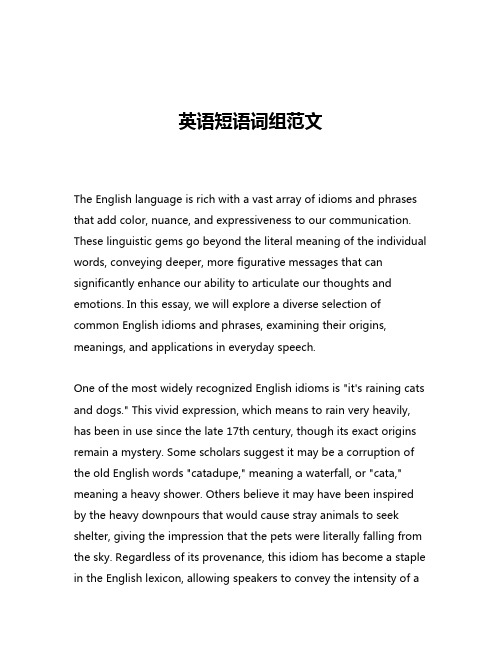
英语短语词组范文The English language is rich with a vast array of idioms and phrases that add color, nuance, and expressiveness to our communication. These linguistic gems go beyond the literal meaning of the individual words, conveying deeper, more figurative messages that can significantly enhance our ability to articulate our thoughts and emotions. In this essay, we will explore a diverse selection of common English idioms and phrases, examining their origins, meanings, and applications in everyday speech.One of the most widely recognized English idioms is "it's raining cats and dogs." This vivid expression, which means to rain very heavily, has been in use since the late 17th century, though its exact origins remain a mystery. Some scholars suggest it may be a corruption of the old English words "catadupe," meaning a waterfall, or "cata," meaning a heavy shower. Others believe it may have been inspired by the heavy downpours that would cause stray animals to seek shelter, giving the impression that the pets were literally falling from the sky. Regardless of its provenance, this idiom has become a staple in the English lexicon, allowing speakers to convey the intensity of arainstorm with a single, memorable phrase.Another common English idiom is "let the cat out of the bag," which means to reveal a secret or surprise. This expression is thought to have originated in the 16th century, when unscrupulous vendors would sometimes try to pass off a cat as a piglet by selling it in a bag. If the customer discovered the deception and opened the bag, the cat would literally be "let out of the bag," exposing the vendor's dishonesty. Over time, the idiom evolved to refer to any situation where a previously concealed truth or piece of information is disclosed.The phrase "break a leg," which is commonly used to wish an actoror performer good luck, is another fascinating example of English idiomatic expression. Contrary to its seemingly negative connotation, this idiom actually carries a positive meaning, originating from the superstition that directly wishing someone "good luck" in the theater could bring bad fortune. By "breaking a leg," the speaker is ironically invoking the opposite of what they hope will happen, thereby ensuring the performer's success. This linguistic quirk has become firmly entrenched in the theatrical community and beyond, serving as a unique way to convey encouragement and well-wishes.One particularly vivid English phrase is "to have butterflies in your stomach," which describes the feeling of nervousness or anxiety. Thisidiom likely derives from the physical sensations associated with being nervous, such as the fluttering or "butterflies" sensation in the abdominal area. The image of delicate, fluttering insects inside the stomach provides a vivid and relatable way to convey the internal experience of apprehension or excitement, making it a widely recognized and frequently used expression.The phrase "to let the cat out of the bag" is another interesting example of an English idiom with an unexpected origin. In this case, the phrase refers to revealing a secret or surprise, but the original meaning was quite different. In the past, unscrupulous vendors would sometimes try to pass off a cat as a more valuable piglet by selling it in a bag. If the customer discovered the deception and opened the bag, the cat would literally be "let out of the bag," exposing the vendor's dishonesty. Over time, the idiom evolved to refer to any situation where a previously concealed truth or piece of information is disclosed.Another common English idiom is "to have a chip on your shoulder," which means to be habitually angry or resentful, often due to a perceived slight or injustice. This expression is thought to have originated in the 19th century, when physical fights were more common. In these altercations, combatants would sometimes place a literal chip of wood on their shoulder, daring their opponent to knock it off and start a fight. The idiom has since evolved to describea more metaphorical "chip" - a lingering sense of grievance or hostility that a person carries with them.The phrase "to let the cat out of the bag" is another interesting example of an English idiom with an unexpected origin. In this case, the phrase refers to revealing a secret or surprise, but the original meaning was quite different. In the past, unscrupulous vendors would sometimes try to pass off a cat as a more valuable piglet by selling it in a bag. If the customer discovered the deception and opened the bag, the cat would literally be "let out of the bag," exposing the vendor's dishonesty. Over time, the idiom evolved to refer to any situation where a previously concealed truth or piece of information is disclosed.Another common English idiom is "to have a chip on your shoulder," which means to be habitually angry or resentful, often due to a perceived slight or injustice. This expression is thought to have originated in the 19th century, when physical fights were more common. In these altercations, combatants would sometimes place a literal chip of wood on their shoulder, daring their opponent to knock it off and start a fight. The idiom has since evolved to describe a more metaphorical "chip" - a lingering sense of grievance or hostility that a person carries with them.These are just a few examples of the rich tapestry of English idiomsand phrases that add depth, color, and nuance to our language. From the whimsical "raining cats and dogs" to the more serious "having a chip on your shoulder," these linguistic gems reflect the creativity, history, and cultural evolution of the English tongue. By understanding and utilizing these expressive turns of phrase, we can not only enhance our own communication skills but also gain a deeper appreciation for the richness and complexity of the English language.。
(完整版)大学英语A级考试——写作专题
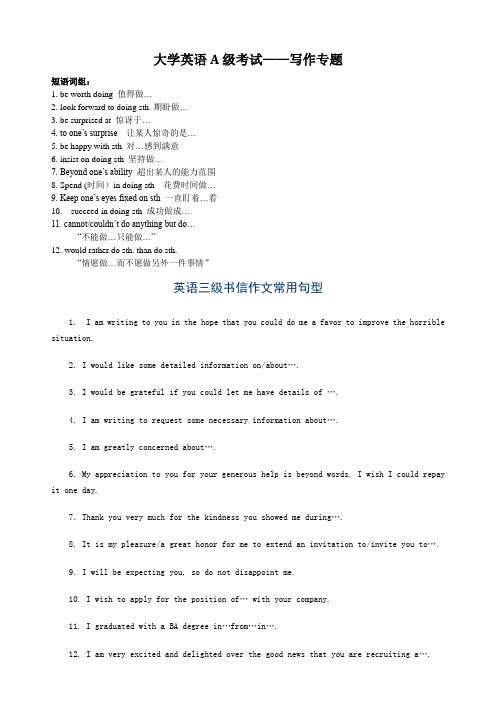
大学英语A级考试——写作专题短语词组:1. be worth doing 值得做…2. look forward to doing sth 期盼做…3. be surprised at 惊讶于…4. to one’s surprise 让某人惊奇的是…5. be happy with sth 对…感到满意6. insist on doing sth 坚持做…7. Beyond one’s ability 超出某人的能力范围8. Spend (时间)in doing sth 花费时间做…9. Keep one’s eyes fixed on sth 一直盯着…看10. succeed in doing sth 成功做成…11. cannot/couldn’t do anything but do…“不能做…只能做…”12. would rather do sth. than do sth.“情愿做…而不愿做另外一件事情”英语三级书信作文常用句型1. I am writing to you in the hope that you could do me a favor to improve the horrible situation.2. I would like some detailed information on/about….3. I would be grateful if you could let me have details of ….4. I am writing to request some necessary information about….5. I am greatly concerned about….6. My appreciation to you for your generous help is beyond words. I wish I could repay it one day.7. Thank you very much for the kindness you showed me during….8. It is my pleasure/a great honor for me to extend an invitation to/invite you to….9. I will be expecting you, so do not disappoint me.10. I wish to apply for the position of… with your company.11. I graduated with a BA degree in…from…in….12. I am very excited and delighted over the good news that you are recruiting a….三级作文常考类型介绍信说明:你是大学教授王平,你的学生张刚即将毕业,毕业后拟到你的朋友Smith先生学校继续深造,攻读硕士学位。
- 1、下载文档前请自行甄别文档内容的完整性,平台不提供额外的编辑、内容补充、找答案等附加服务。
- 2、"仅部分预览"的文档,不可在线预览部分如存在完整性等问题,可反馈申请退款(可完整预览的文档不适用该条件!)。
- 3、如文档侵犯您的权益,请联系客服反馈,我们会尽快为您处理(人工客服工作时间:9:00-18:30)。
英语词组及短语范文一,动词词组 (包括短语动词、介词词组和其他词组)(一)由be构成的词组1)be back/in/out 回来/在家/外出2)be at home/work 在家/上班3)be good at 善于,擅长于4)be careful of 当心,注意,仔细5)be covered with 被……复盖6)be ready for 为……作好准备7)be surprised (at) 对……感到惊讶8)be interested in 对……感到举9)be born 出生10)be on 在进行,在上演, (灯)亮着11)be able to do sth. 能够做……12)be afraid of (to do sth. that…) 害怕……(不敢做……,恐怕……)13)be angry with sb. 生(某人)的气14)be pleased (with) 对……感到高兴(满意)15)be famous for 以……而著名16)be strict in (with) (对工作,对人)严格要求17)be from ……,什么地方人18)be hungry/thirsty/tired 饿了/渴了/累了19)be worried 担忧20)be (well) worth doing (非常)值得做……21)be covered with 被……所覆盖……22)be in (great) need of (很)需要23)be in trouble 处于困境中24)be glad to do sth. 很高兴做……25)be late for ……迟到26)be made of (from) 由……制成27)be satisfied with 对……感到满意28)be free 空闲的,有空29)be (ill) in bed 卧病在床30)be busy doing (with) 忙于做……(忙于……)(二)由e,do,get,give,go,have,help,keep,make,look,put,set,send,take ,turn,play等动词构成的词组1)e back 回来2)e down 下来3)e in 进入,进来4)e on 快,走吧,跟我来5)e out出来6)e out of 从……出来7)e up 上来8)e from ……9)do one's lessons/homework 做功课/回家作业10)do more speaking/reading 多做口头练习/朗读11)do one's best 尽力12)do some shopping (cooking reading, cleaning)买东西(做饭菜,读点书,大扫除)13)do a good deed (good deeds)做一件好事(做好事)14)do morning exercises 做早操15)do eye exercises 做眼保健操16)do well in 在……某方面干得好17)get up 起身18)get everything ready 把一切都准备好19)get ready for (=be ready for) 为……作好准备20)get on (well) with 与……相处(融洽)21)get back 返回22)get rid of 除掉,去除23)get in 进入,收集24)get on/off 上/下车25)get to 到达26)get there 到达那里27)give sb. a call 给……打电话28)give a talk 作报告29)give a lecture (a piano concert)作讲座(举行钢琴音乐会)30)give back 归还,送回31)give……some advice on 给……一些忠告32)give lessons to 给……上课33)give in 屈服34)give up 放弃35)give sb. a chance 给……一次机会36)give a message to……给……一个口信37)go ahead 先走,向前走,去吧,干吧38)go to the cinema 看电影39)go to bed 睡觉(make the bed 床铺)40)go to school (college) 上学(上大学)41)go to (the) hospital 去医院看病42)go over 过一遍,复习/ go over to 朝……走去43)go fishing/skating/swimming/shopping 去钩鱼/滑冰/游泳/买东西44)go home (there) 回家去(去那儿)45)go round 顺便去,绕道走46)go up 上去47)go out for a walk 外出散步48)go on (doing) 继续(做……)49)go on with one's work 继续某人的工作50)go upstairs/downstairs 上/下楼51)(the lights) go out (灯)熄了52)have a lesson (lessons)/a meeting 上课/开会53)have a football match (basketball match) 举行一场足球(蓝球)赛54)have dictation 听见55)have a try 试一试56)have a good/wonderful time 玩得很高兴57)have a lecture (a piano concert) 听讲座(听钢琴音乐会)58)have a report (talk) on 听一个关于……的报告59)have a glass of water (a cup of tea) 喝一杯水,(一杯茶)60)have breakfast/lunch/supper 吃早饭/午饭/晚饭61)have a meal (three meals) 吃一顿饭(三餐饭)62)have a dinner 吃正餐63)have bread and milk for breakfast 早饭吃面包和牛奶64)have (have got) a headache 头痛65)have a fever 发烧66)have a cough (a cold) 咳嗽(感冒)67)have a look (at) 看一看……68)have a rest (a break) 休息一会儿(工间或课间休息)69)have a talk 谈话70)have a swim/walk 游泳/散步71)have sports 进行体育锻炼72)have a sports meet (meeting) 开运动会73)have something done 让人(请人)做……75)have an idea 有了个主意76)had better do sth. (not do sth.) 最好做……(最好不要做……)77)have a word with 与……谈几句话78)help sb. with sth. help sb. do sth. 在……方面帮助……帮助……做79)help oneself to some chicken/fish/meat 请随便吃点鸡/鱼/肉80)help each other 互相帮助81)keep up with 跟上……,不落后于……82)keep silent/quiet 保持沉默/安静83)keep sb. doing sth. 使……一直做……84)keep one's diary 记日记85)make a noise (a lot of noise, much noise, noises)吵闹(十分嘈杂,响声)86)make a living 谋生87)make sb. do sth. 迫使某人做……88)make faces (a face)做鬼89)make friends (with)与……交朋友90)make a mistake (mistakes)犯错误91)make room/space for 给……腾出地方92)make a sentence (sentences)with 用……造句93)make a fire 生火94)be made from/of 由……制成95)be made in 在……地方制造96)look out of (outside) 往外看(看外面)97)look up a word (in the dictionary)98)look up 往上看,仰望99)look after 照管,照看,照顾100)look for 寻找101)look like 看上去像102)look fine/well/tired/worried 看起来气色好/健康/疲劳/忧虑 103)look out 当心,小心104)look on …as…把……当作……看待105)look around 朝四周看106)look at 看着……107)put on 穿上(衣服),戴上(帽子),上演(戏剧)108)put up 建造,搭起,挂起,举起,109)put into 使进入,输入110)put one's heart into 全神贯注于111)put…down…把……放下112)put…into…把……译成113)set up 竖起,建起114)set off 出发,动身115)set out 出发116)set an example for 为……树立榜样117)send for 派人去请(叫)118)send out 放出,发出119)end up 把……往上送,发射120)take one's advice 听从某人劝告121)take out 拿出,取出122)take down 拿下123)take place 发生124)take one's place 坐……的座位,代替某人职务125)take the place of 代替……126)take a walk/rest 散步/休息127)take it easy 别紧张128)take sth. with sb. 随身带着129)take sb. to a park/London for one's holidays 带某人去公园/伦敦度假130)take care of 关心,照顾,保管131)take a look (a last look) at 看一看(最后看一眼)132)take an exam 参加考试133)take away 拿走134)take back 收回,带回135)take hold of 抓住……136)take off 脱下(衣,帽,鞋等)拿掉137)take (an active) part in (积极)参加(活动)138)take photos 拍照139)take some medicine 服药140)take a bus/train, boat/ 乘公共汽车,火车/船141)turn on 开,旋开(电灯,收音机等)142)turn off 关上(电灯,收音机等)143)turn in 交出,上交144)turn…into…变成145)turn to 翻到,转向146)turn down (把音量)调低147)turn…over 把……翻过来148)play basketball 打篮球,football 踢足球,volleyball 打排球 149)play games 做游戏150)play the piano (the violin) 弹钢琴(拉小提琴)151)play with snow 玩雪152)play a joke (on) 对……开玩笑(三)由其他动词构成的词组153)think over 仔细考虑154)arrive at/in a place 到达某处155)eat up 吃完,吃光156)do well in 在……干得好157)enjoy doing sth. like doing sth. 喜欢做某事喜欢干某事 158)find out 发现,查出(真相等)159)finish off 吃完,喝完160)stop doing sth. 停止做某事161)stop to do sth. 停下来去做某事162)hold a meting 举行会议163)hold up 举起164)hurry up 赶快,快点165)enter for 报名参加166)laugh at 嘲笑167)be used to 习惯于168)used to 过去常常169)wake…up 唤醒170)work out 算出171)sth happen to sb 某人发生某事172)sb happen to do sth 某人碰巧做某事二,动词短语,介词短语和其他词组1)ask for 向……要……,请求2)ask for leave 请假3)send for 派人去请(叫)4)pay for 付……的款5)wait for 等候6)thank for 为……感谢7)apologize to sb. for sth. 为某事向某人道歉1. To do 结构ask sb. to do sth.请(叫)某人做某事tell sb to do sthhelp sb ( to) do sth. 协助做某事want sb to do sth. 想要做某事wish sb to do sth. 希望做某事invite sb. to do sth. 约请某人做某事drive sb. to do sth .驱使某人做某事expect sb. to do sth. 希冀某人做某事forbid sb. to do sth. 制止某人做某事force sb. to do sth. 强迫某人做某事hope to do sth. 希望做某事offer to do sth. 自动提出做某事 plan to do sth. 方案做某事 prepare to do sth. 预备做某事 pretend to do sth. 伪装做某事 promise to do sth. 容许做某事 refuse to do sth. 回绝做某事 fail to do sth. 未能做某事happen to do sth. 碰巧做某事need sb to do sth need doing =need to be doneadvise sb. to do sth. 建议某人做某事 advise doing sth. 建议做某事allow sb. to do sth. 允许某人做某事allow doing sth2. ing 结构consider doing sth. 思索做某事enjoy doing sth. 喜欢做某事 escape doing sth. 逃脱做某事finish doing sth. 完成做某事give up doing sth. 保持做某事imagine doing sth. 想象做某事mind doing sth. 介意做某事practice doing sth. 练习做某事prevent doing sth. 阻止做某事put off doing sth. 推延做某事risk doing sth. 冒险做某事forbid doing sth. 制止做某事 forgive doing sth. 原谅做某事3. 既 to 又 ing (1) remember to do sth.remember doing sth.(2) forget to do sth. forget doing sth. (3) regret to do sth. regret doing sth. (4) try to do sth.try doing sth. (5) stop to domake sth done have sb. do sth. 使某人做某事have sth done see sb. do sth. 看见某人做某事see sb doing hear sb. do sth. 听见某人做某事hear sb doinglisten to sb. do sth. 听着某人做某事listen sb doing sthlook at sb. do sth. 看着某人做某事 watch sb. do sth. 察看某人做某事 feel sb. do sth. 觉得某人做某事Had batter do sth 5. 双宾语 give sb sth = give sth to sb tell sb sth = tell sth to sb borrow sth from sb lend sth to sb buy sth for sb =buy sb sthshow sb sth=show sth to sbget over 克服进入,收集 get inget on/off 上/下车get to 到达reach arrive in/at6. Be 动词结构 have a lesson /a meeting上课/开会be at home = stay at home have a try 试一试be in troublehave a good time 玩得很高兴 be careful of be late for be free 空闲的,有空be busy doing/with sthbe covered with 被……复盖be ready for 为……作好准备be surprised (at) 对……感到惊讶be interested in对……感到举be excited aboutbe angry withbe mad atbe friendly tobe pleased withbe satisfied withbe famous forbe famous asbe strict withbe strict inbe afraid ofbe afraid to dobe worried about =be anxious about be glad to dobe from = e frombe good forbe bad forbe good at = do well inbe able to do7. Go , get……结构 go go bed 睡觉 go to sleepgo to schoolgo homego fishing /swimming/shoppinggo over 复习have fun have breakfast/lunch/supper 吃早饭/午饭/晚饭 have a meal (three meals) 吃一顿饭have a fever 发烧 have a coldb感冒 have a look (at) 看一看…… have a rest 休息一会儿 have a talk 谈话 have a walk =take a walk 散步 make friends (with)与……交朋友 make a living 谋生 make a mistake (mistakes)犯错误 make a sentence be made from/of 由……制成be made in 在……地方制造 look after =take care of照管,照看, look for 寻找 look like 看上去像 look out 当心,小心 look around 朝四周看 look at 看着…… put on 穿上(衣服),戴上(帽子) put up 张帖 set up 竖起,建起set off 出发,动身set out 出发 send for 派人去请 take one's advice 听从某人劝告 take out 拿出,取出 take down 拿下 take place 发生take the place of 代替 take it easy 别紧张 take away 拿走 take off 脱下,起飞,休假day off / have off 休假 take photos 拍照take some medicine 服药turn on 开,旋开(电灯,收音机等) turn off 关上(电灯,收音机等) turn down (把音量)调低 turn upturn in 交出,上交 turn…into…变成turn…over 把……翻过来at once 立刻 at last 最后at first 起先,首先at the age of…在……岁时at the end of…在……之末 by the end of…到……底为止 at the beginning of…在……之初 at night/noon 在夜里/中午 in the dayin all 总共 in fact 事实上in one's twenties 在某人二十几岁时 in a hurry 匆忙 in time on timein public 公众,公开地 in order to 为了…… in front of 在……前面 in the front ofin the end 最后,终于 in turn 依次of course 当然from now on从现在起 from then on 从那时起 for example 例如 far away from 远离by the way 顺便说 in the way in this way on one's waya piece of 一张(一片,块) a cup of一茶怀 a glass of一玻璃杯 a box of一盒 a bottle of一瓶 a set of 一套a group of一队,一组,一群 a kind of 一种 all kinds of kind ofa type of 一种类型的a different type of 一种不同型号的 a great deal of 非常多,大量的(不可数名词)a large (great) number of非常多,大量的(可数名词)a great many 大量,许多(可数名词) all over the world/the country 全世界/全国the whole country/the whole worldday after day 日复一日 day by dayup and down 上上下下the day after tomorrow 后天the day before yesterday 前天8.其他固定搭配langht at 嘲笑be used to doing习惯于 used to 过去常常 use sth to do sth be used to do be used for doing wake…up 唤醒 work out 算出 hurry up 赶快,快点think about考虑…… think ofworry about = be worried about = be anxious about 担忧 throw away 扔掉 hear of 听说hear from 收到……来信 instead of 代替……with one's help 在某人的帮助下,由于with the help of …在……的帮助下 to one's surpriseup and down 上上下下 just now/then 刚才/那时 late on 过后,后来 work /study hard e out wait fordo morning exercises 做早操 do eye exercises 做眼保健操get on/along (well) with 与……相处(融洽In the hospital In hospitalkeep up with 跟上……, be different from three minutes' walk so farcatch the early busIt takes sb some time to do sthsb spend some time/money (in)doing /on sthhundreds / thousands /millions of内容仅供参考。
